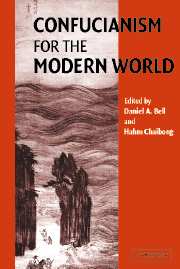Book contents
- Frontmatter
- Contents
- List of Contributing Authors
- Acknowledgments
- Editors' Note
- Introduction: The Contemporary Relevance of Confucianism
- PART I CONFUCIAN PERSPECTIVES ON DEMOCRACY
- PART II CONFUCIAN PERSPECTIVES ON CAPITALISM
- PART III CONFUCIAN PERSPECTIVES ON LAW
- 11 Mediation, Litigation, and Justice: Confucian Reflections in a Modern Liberal Society
- 12 Traditional Confucian Values and Western Legal Frameworks: The Law of Succession
- 13 The Confucian Conception of Gender in the Twenty-First Century
- 14 Family Versus the Individual: The Politics of Marriage Laws in Korea
- Epilogue: Why Confucius Now?
- Index
11 - Mediation, Litigation, and Justice: Confucian Reflections in a Modern Liberal Society
Published online by Cambridge University Press: 28 August 2009
- Frontmatter
- Contents
- List of Contributing Authors
- Acknowledgments
- Editors' Note
- Introduction: The Contemporary Relevance of Confucianism
- PART I CONFUCIAN PERSPECTIVES ON DEMOCRACY
- PART II CONFUCIAN PERSPECTIVES ON CAPITALISM
- PART III CONFUCIAN PERSPECTIVES ON LAW
- 11 Mediation, Litigation, and Justice: Confucian Reflections in a Modern Liberal Society
- 12 Traditional Confucian Values and Western Legal Frameworks: The Law of Succession
- 13 The Confucian Conception of Gender in the Twenty-First Century
- 14 Family Versus the Individual: The Politics of Marriage Laws in Korea
- Epilogue: Why Confucius Now?
- Index
Summary
In every society there is a wide range of alternatives for coping with the conflict stirred by personal disputes. Litigation is only one choice among many possibilities, ranging from avoidance to violence. The varieties of dispute settlement, and the socially sanctioned choices in any culture, communicate the ideals people cherish, their perceptions of themselves, and the quality of their relationships with others. They indicate whether people wish to avoid or encourage conflict, suppress it, or resolve it amicably. Ultimately the most basic values of society are revealed in its dispute settlement procedures.
— Jerold S. Auerbach, Justice Without Law? (New York: Oxford University Press, 1983), pp. 3–4INTRODUCTION
The nature, structure, and operation of the institutions for dispute settlement of every society are an expression of its culture, its philosophy, its world view, as well as its mode of social, economic, and political organization. It is well known that in traditional China, mediation rather than litigation was the preferred means of dispute settlement in ordinary civil disputes among the people. The theory and practice of mediation have largely been shaped by Confucian philosophy. The system of mediation was also compatible with, and served well the needs of, the traditional society with its agrarian economy, kinship-based social structure, loose mode of central imperial rule, and emphasis on social stability rather than economic development.
- Type
- Chapter
- Information
- Confucianism for the Modern World , pp. 257 - 287Publisher: Cambridge University PressPrint publication year: 2003
- 7
- Cited by



